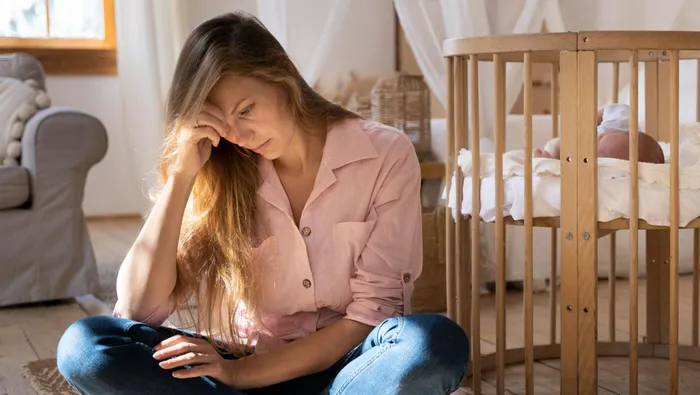
Maternal mental health: The silent struggle of mothers in South Africa
Image: Freepik
As we marked World Suicide Prevention Month in September, stakeholders have shed light on the silent suffering of mothers as they battle maternal mental health issues including, anxiety, post-traumatic stress, and postpartum depression. They also emphasised the need for mothers to seek help and for family and society to offer them support.
WHILE more mothers reportedly battle with maternal mental health issues in South Africa, many continue to suffer in silence due to the fear of judgement and stigma.
Cassey Chambers, the operation director of the South African Depression and Anxiety Group (Sadag), said maternal mental health was not often previously spoken about.
“Communities and society at large are still learning about it. But with more people, especially mothers, now talking about it, it is seemingly coming to the fore," said Chambers.
She said the sad reality was that mothers feared judgement or stigma and suffered in silence until it was too much to bear.
Chambers said Sadag received numerous calls and messages, especially via WhatsApp, from women seeking help daily.
"From these calls and messages, we find that mothers have reached their break-point. They are overwhelmed, feel hopeless and are at the point where the suicidal thoughts consume them."
Sadag offered them a safe space to express themselves.
"We offer counselling and let them know there are resources available for them to seek help. Just because mothers are smiling, it should not be assumed they are okay."
Alexandra Wallis, the founder of the Mums Support Network, said they received several calls and and messages from mothers every day seeking help.
The organisation aims to provide emotional support and encouragement to mothers in need.
“The mothers have said they feel as if they are failing their children, are not doing enough, or their children deserve better mothers. This is heartbreaking to hear."
She said while some mothers were fortunate to receive medical assistance and psychotherapy, peer support was vital and that was why they offered WhatsApp support groups.
"Women need other women. It's wired into us biologically."
Wallis said family must be cognisant that mental maternal health issues was not an illness.
Kim Vermaak, a paternal mental health advocate and author, said the words "this baby would be better off without me", though rarely spoken aloud, echoed in the hearts of many mothers battling postpartum depression.
She said she understood the pain having experienced postpartum depression with all three of her children.
“I know the overwhelming feelings of isolation and despair that can accompany motherhood. I was often consumed by intrusive thoughts questioning my worth and ability as a mother. But it was faith, counselling, lifestyle changes, and the courage to seek help that guided me through it.”
Vermaak said despite the prevalence of postpartum depression, many parents hid behind smiles, concealing their struggles.
“Too often, parents suffer in silence, fearing judgement or not knowing where to turn. It is time to break the stigma and start a conversation.”
Yajna Aheer, a specialist wellness counsellor, said motherhood was often romanticised as a time of joy, but the reality could be isolating and overwhelming.
“Many mothers silently battle anxiety, stress, sleep deprivation, and a profound shift in identity, while feeling inadequate or disconnected from their former selves.”
She said postpartum depression was one of the most pressing mental health crises for mothers.
“It is far more than the fleeting baby blues. It is a serious mental health condition that persists beyond the first two weeks after childbirth. It is characterised by persistent sadness, hopelessness, and a struggle to bond with one’s child.
“When left untreated, postpartum depression can lead to emotional withdrawal from the baby, partner, and loved ones. There are feelings of guilt, shame, or worthlessness; strained relationships; social isolation; and even thoughts of self-harm. Its ripple effects extend beyond the individual, affecting familial bonds and a child’s emotional and cognitive development. It is a silent storm that too many mothers endure alone."
Recognising the signs early, she said, was crucial.
These included: persistent sadness, emptiness, or hopelessness, extreme fatigue and loss of interest in life’s activities, emotional withdrawal from the baby and loved ones, and thoughts of self-harm or harming the baby, which required urgent professional help.
“It is also not a matter of snapping out of it. Healing requires courage, patience, and access to the right support. Therapy, support groups, and medical interventions are powerful tools, but equally important is self-compassion.
“Mothers must give themselves permission to rest, to receive help, and to prioritise their mental and physical well-being. One cannot pour from an empty cup - taking care of oneself is not selfish. It is an act of love, not only for the mother, but for her child."
Aheer added that loved ones played a significant role by offering a listening ear, practical help, and unconditional understanding.
"They remind her that seeking help is strength, not weakness, and that she is worthy of care, patience, and compassion. True support transforms isolation into hope and despair into healing.
“To every mother struggling, you are not failing, you are human, and you are not alone. Your experience does not define your worth. Speak up, reach out, and surround yourself with people who hold space for your pain and your healing. Prioritising your mental health is not optional, it is essential. Healing is possible, and with support, guidance, and self-compassion, you can reconnect with your true self and rediscover the joy in motherhood,” she said.
Related Topics: